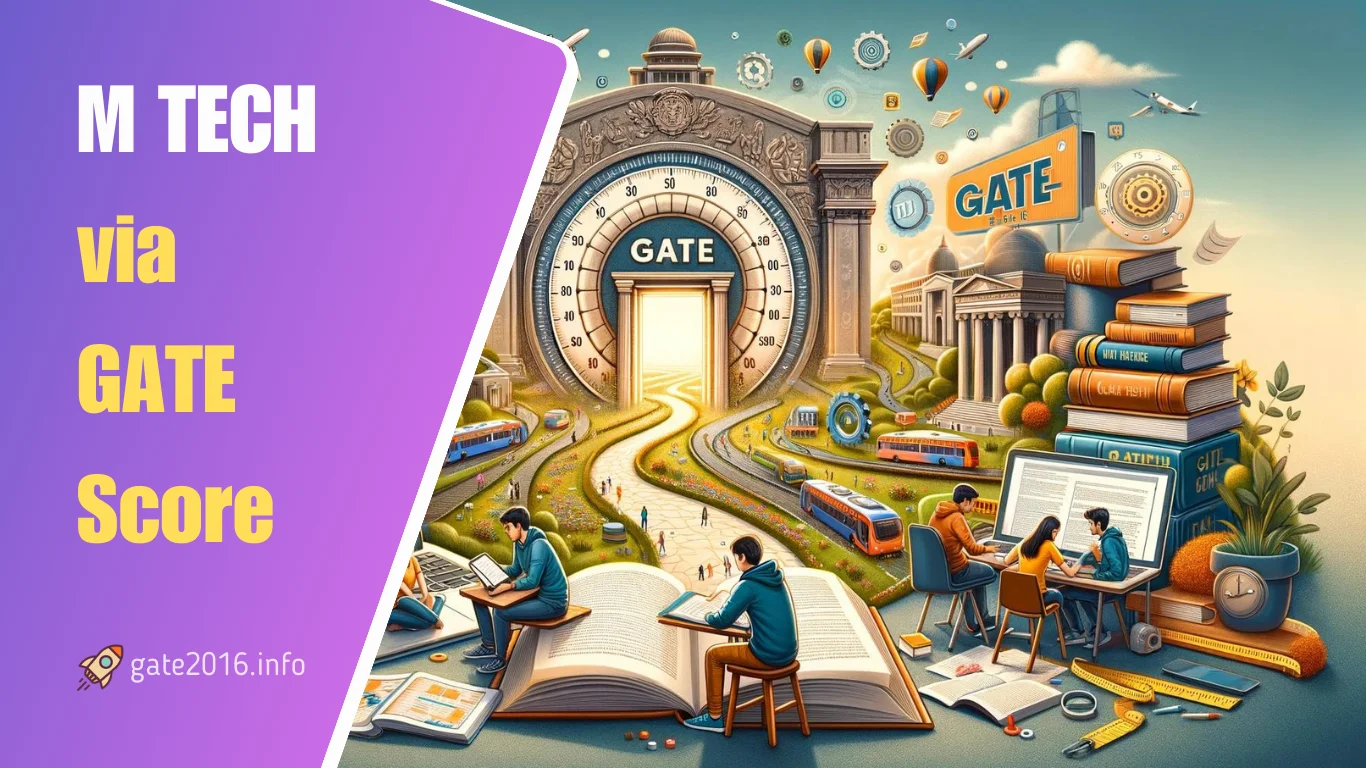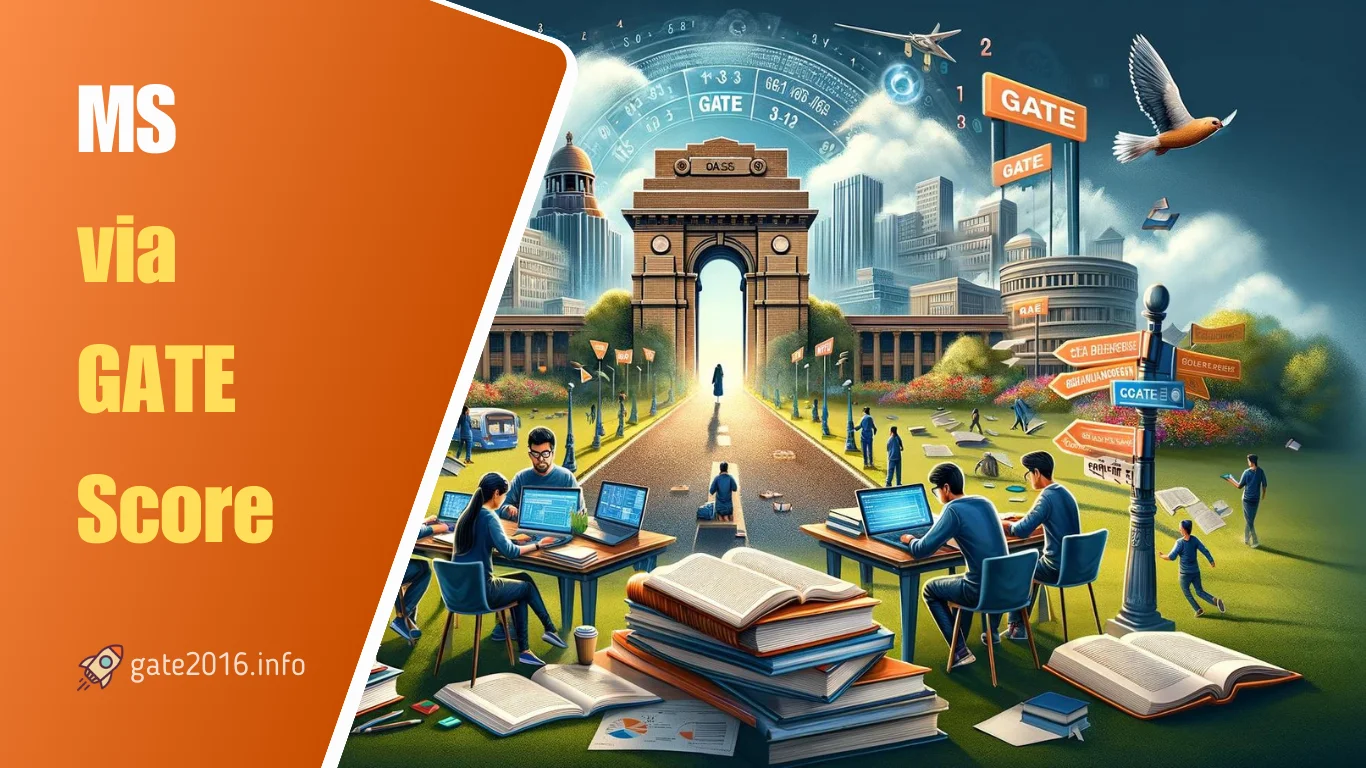Advertisements
Ratings
M Tech and MS Programs Through GATE and GRE – In the realm of postgraduate education, two common paths pursued by engineering and related field graduates are M.Tech and MS programs.
The Graduate Aptitude Test in Engineering (GATE) serves as a crucial gateway for M.Tech admissions in India, while the Graduate Record Examination (GRE) is widely recognized for admissions to MS programs abroad.
This article aims to provide a detailed comparison between M.Tech via GATE Score, MS via GATE Score, and MS via GRE, outlining their respective admission processes, pros, and cons.
Contents
M Tech via GATE Score

M.Tech programs in India are highly sought after by engineering graduates seeking specialized knowledge and expertise in their field. Here’s a comprehensive overview of pursuing M.Tech via GATE Score:
- Explanation of M.Tech Programs: M.Tech programs offer advanced study and research opportunities in various engineering disciplines, allowing students to specialize in specific areas of interest.
- GATE Exam and its Significance: The GATE exam is a national-level entrance test conducted to assess the aptitude and subject knowledge of engineering graduates. GATE scores are widely accepted by premier institutes such as IITs, NITs, and other top universities for M.Tech admissions.
- Admission Process for M.Tech via GATE Scores: The admission process typically involves qualifying the GATE exam with a minimum cutoff score set by the respective institutes. Shortlisted candidates may further undergo interviews, written tests, or counseling sessions for final selection.
- Pros and Cons: Advantages of pursuing M.Tech via GATE include access to prestigious institutions, specialized curriculum, research opportunities, and career advancement. However, challenges such as intense competition, limited seats, and rigorous academic requirements must be considered.
- Case Studies: Detailed case studies of successful M.Tech aspirants who secured admission through GATE scores, showcasing their academic background, GATE score, institute selection, and career aspirations.
MS via GATE Score

While GATE is primarily known for M.Tech admissions in India, an emerging trend is the acceptance of GATE scores by international universities, particularly for MS programs. Here’s what you need to know about pursuing MS via GATE Score:
- Introduction to MS Programs: MS programs offer advanced study and research opportunities at universities abroad, allowing students to gain global exposure and expertise in their field of study.
- Acceptance of GATE Scores: Several European and other international universities now recognize GATE scores for admissions to MS programs, particularly in engineering and related disciplines.
- Admission Process: Similar to M.Tech admissions, the admission process for MS via GATE scores involves qualifying the GATE exam with a minimum cutoff score set by the respective universities. Additional requirements such as English proficiency tests or interviews may apply.
- Comparison with MS in India: Comparing MS programs in India and abroad, highlighting differences in curriculum, research opportunities, faculty expertise, and career prospects.
- Advantages and Challenges: Advantages of pursuing MS via GATE include exposure to global education standards, diverse cultural experiences, and career opportunities abroad. However, challenges such as relocation, financial considerations, and adapting to a new academic environment must be addressed.
MS via GRE

For Indian students aspiring to pursue MS programs abroad, the Graduate Record Examination (GRE) is a widely accepted standardized test. Here’s what you need to know about pursuing MS via GRE:
- Overview of GRE: The GRE exam assesses verbal reasoning, quantitative reasoning, analytical writing, and critical thinking skills. GRE scores are accepted by thousands of universities worldwide for admissions to graduate programs.
- Admission Process: The admission process for MS programs via GRE scores involves submitting GRE scores along with other application materials such as academic transcripts, letters of recommendation, and statement of purpose. Some universities may also require additional tests such as TOEFL or IELTS for English proficiency.
- Comparison with GATE: Contrasting the admission process, curriculum, and requirements for MS programs via GRE with those via GATE, highlighting differences in focus, eligibility criteria, and global recognition.
- Pros and Cons: Advantages of pursuing MS via GRE include access to a wide range of universities and programs worldwide, flexibility in choosing specializations, and exposure to diverse academic environments. However, challenges such as standardized test preparation, application costs, and visa requirements must be considered.
- Case Studies: Detailed case studies of Indian students who pursued MS programs abroad through GRE scores, showcasing their academic background, GRE score, university selection, and post-graduation outcomes.
Conclusion
In conclusion, the choice between M.Tech via GATE Score, MS via GATE Score, and MS via GRE depends on individual preferences, career aspirations, and academic goals.
While M.Tech via GATE remains a popular choice for engineering graduates in India, the acceptance of GATE scores by international universities for MS programs presents exciting opportunities for global education and career advancement.
Similarly, MS programs via GRE offer a gateway to prestigious universities abroad, providing exposure to diverse academic environments and career pathways.
Ultimately, prospective students must weigh the pros and cons of each option and choose the path that aligns with their aspirations and ambitions.
M Tech and MS Programs Through GATE and GRE FAQs
What is the difference between M.Tech and MS programs?
M.Tech (Master of Technology) is typically a specialized engineering program focusing on technology and application-oriented subjects, popular in India. MS (Master of Science), especially in the context of studying abroad, often has a broader scope including research, and it emphasizes theoretical aspects alongside practical application.
Can I pursue MS abroad through the GATE score?
While GATE is predominantly recognized for admissions to M.Tech programs in India, a few universities abroad, especially in countries like Germany and Singapore, may accept GATE scores for MS programs. However, this is less common, and GRE scores are generally preferred for MS admissions abroad.
Is GRE required for M.Tech admissions in India?
No, GRE scores are generally not required for M.Tech admissions in India. The primary entrance exam for M.Tech admissions in India is GATE. GRE is more commonly required for graduate studies, like MS programs, particularly in the United States and other countries.
How does the GRE differ from the GATE in terms of exam content?
The GRE is a standardized test that measures verbal reasoning, quantitative reasoning, and analytical writing skills and is used for a wide range of graduate programs. In contrast, GATE is an engineering-focused exam that tests the technical knowledge specific to various engineering disciplines and some science subjects.
Can I apply for M.Tech programs in India with GRE scores?
Generally, Indian universities require GATE scores for M.Tech admissions. However, some private universities and institutions may accept GRE scores, especially for candidates applying from abroad or for certain specialized programs.
Recent Posts
- AAI Through GATE 2024 – JE (Junior Executive)
- M Tech and MS Programs Through GATE and GRE: Navigating Postgraduate Options
- Job Opportunities After GATE 2024 in India: What You Didn’t Know!
- BSPHCL Through GATE 2024 – 40 AEE
Related Tags
gate or gre which is tougher, gre or gate which is better, gate vs gre vs gmat, gre syllabus,
gre full form, gate 2024, is gre and gate syllabus same, gre exam fee




